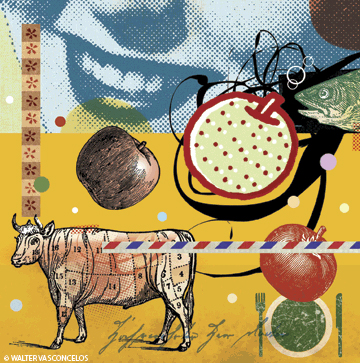
Earlier this year, Amy Trubek Gr’95 spoke at a culinary symposium in France— where, she recalls, she was astounded to learn that people were not only reading her book in English but “liking it and asking that it be translated into French.” The book is Haute Cuisine: How the French Invented the Culinary Profession (University of Pennsylvania Press), and it is based on Trubek’s dissertation research as a graduate student in anthropology at Penn.
That she would be popular in the land of gastronomieand terroir is not really surprising. Trubek is one of the leaders of a social culinary revolution that affects not just good-tasting food but nutrition, culture, agriculture, and food-handling. Think Alice Waters, M.F.K. Fisher, and terms like slow food, Buy Local-Buy Fresh, organic, and taste of place, and you understand the world in which she operates and the company she keeps.
“When you have a powerful passion,” she says, “you can have interesting things happen to you.” Her passion has led her down some interesting paths: hunting down the wild source of shagbark hickory nuts used in L’Etoile (a Madison, Wisconsin-based, Waters-like restaurant); networking with Vermont chefs, farmers, and livestock owners; or consulting with academic nutritionists at the University of Vermont with an eye toward making the curriculum more culturally informed.
When Alton Brown, the Food Network’s star of Good Eats, mentions produit de terroir or invites a food or culinary anthropologist on his show, chances are Trubek had something to do with it. Brown took Trubek’s course in the history of food at the Vermont-based New England Culinary Institute (NECI), which hired her to create a special curriculum focusing on the cultural and historical aspects of food and food production. Trubek also appeared on Brown’s early shows and helped with the scripts.
Her passion for food began early. When she was young her family lived in Brazil and Belgium, and by high school she was working in a small, family-owned hamburger joint in Madison. Then she and a friend started a catering company, which they ran until Trubek went off to study anthropology at Haverford College. During her junior year, she lived and studied in India, taking in the new foods, markets, culinary practices, and customs. After college, she apprenticed under a chef in a French restaurant in Cambridge, Massachusetts.
Through all these experiences Trubek witnessed how food and eating, cooking and culinary customs were both a core part of a culture and a great way to understand it.
She also had gained enough experience in restaurants to learn how hard the work was.
“I didn’t want to do it for life, but I did want to master the techniques,” she says. “I was 24 and hoped to become a food journalist. But how do you do that? There were no programs for it.” She first enrolled in the Cordon Bleu Culinary School in London, and then applied to graduate school in anthropology “to learn as much as I could about food and culture.”
Part of her rationale for choosing Penn was that she wanted to be in a big city where she could keep cooking on a professional level. When she found that Penn faculty members Dr. Arjun Appadurai, then professor of anthropology, and Dr. David Ludden, professor of history, both had a keen interest in food and culture, it clinched the deal.
“I was very focused,” she recalls. “Because there was no program in food and culture, I took courses that seemed best directed toward a cohesive education.” Her dissertation was titled The Empire of the Senses: French haute cuisine and the rise of the modern culinary profession, 1870-1910.
After Penn, Trubek invented herself yet again, accepting an offer from the NECI to develop its Creative and Critical Thinking Program. Trubek developed coursework on several themes: food and globalization, agricultural practices in the United States, and the culinary profession’s history and present. Trubek also worked with chefs and food producers—from farmers to cheese-makers to ranchers—who were passionate about using and developing the locally available products in Vermont.
“I hooked up with an intelligent, hippie farmer and started taking my students out to his farm for fieldtrips,” she recalls. “Then this farmer started to teach what it meant to be a farmer and to produce these products.”
Trubek began looking at globalization, agriculture, and food in the context of these local realities. She now focuses on a movement toward reclaiming gout de terroir, the taste of place, which captures the full spectrum of the practice of producing and consuming local foods whose personality and flavor are unique because of the soil, climate, and local agricultural practices. Gout de terroir, and its relevant components of produit de terroir and cuisine de terroir, is at the heart of Trubek’s outlook and research.
In 2002 Trubek was appointed a Food & Society Policy Fellow through a program funded by the Kellogg Foundation. As a Fellow, she worked with all the players in food production and consumption—consumers and farmers, policymakers and opinion leaders—toward creating sustainable, locally supportive food systems. She also collaborated with the Vermont Fresh Network (VFN), which was established in 1996. Now, as VFN’s executive, she coordinates a network of approximately 150 Vermont chefs, 100 local farmers, and 50-75 consumers. Chefs in the network must work with at least three farmers, who provide them with food that is locally grown, produced on a smaller scale, and handled more carefully. Farmers are guaranteed regular purchasers for their labor-intensive products when these products are at their best and freshest, and consumers benefit from Vermont’s unique gout de terroir.
Trubek also teaches in the University of Vermont’s Department of Nutrition and Food Science, urging students to think more broadly about nutrition and health issues. In addition, she collaborates with nutritionists at the university to introduce more cultural and whole-systems-oriented ideas to students.
For Trubek, a person’s food choices are driven by values: “Cooking, and cooking with raw ingredients, is becoming a lost cultural knowledge—does this have implications for obesity?”
The very values driving celebrity chefs and farmers to partner together could lead to alternatives to fast food and poor dietary habits, she suggests: “Food can be seen as a positive, social good, and as a cultural heritage. We need to change how everyone thinks about food in the U.S., offering a broader understanding of what food is and what it signifies to people. We need a cultural discussion on food and our priorities.
“There’s been a very powerful shift where chefs have become cultural brokers,” Trubek adds. “Chefs have become celebrities and are at the forefront of changing the values of how food is produced, purchased, and consumed. Food is more than things in boxes.”
Reflecting on the advances of the past 20 years, Trubek admits that the current trends in values and practices are what she was looking for when she first began this journey. At the time, she did not know that she was going to be one of the pioneers helping to make it happen.
—Beebe Bahrami Gr’95




